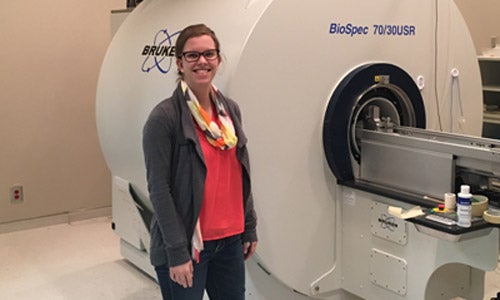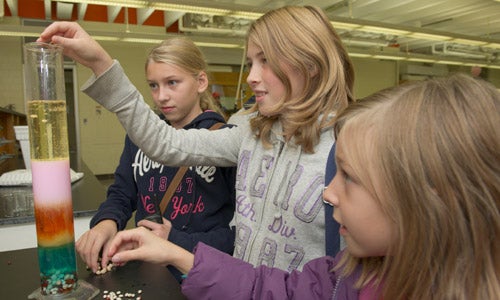
Sharing a passion for physics with middle school girls
Kayla Sutton tells girls that everyone who studies physics struggles at some point — but it's all worth it

Kayla Sutton tells girls that everyone who studies physics struggles at some point — but it's all worth it
By Suzanne Bowness University Relations
Waterloo physics alumnus Kayla Sutton in a laboratory
Kayla Sutton thinks medical biophysics is “really cool” and she wants to pass along her enthusiasm to young girls who may not realize how studying physics can open up exciting career opportunities.
She also wants girls to realize they don’t have to take themselves too seriously to pursue physics.
“I want girls to know that they don't have to feel like they know everything and that they're the smartest,” says Sutton, a Waterloo physics alumnus who graduated with a minor in biophysics. “I think it's important to let them know that everyone who does physics has struggled at some point, and it's a lot of hard work, but it’s all worth it.”
Sutton is a keynote speaker at a PhysiXX: Girls Matter conference for girls in Grades 7 and 8 held at the University of Waterloo on December 3. The event is organized through the Faculty of Science’s outreach program and is part of Waterloo’s HeForShe IMPACT 10x10x10 campaign. Her talk is one of two keynotes, in a day that’s filled with hands-on activity and panel discussions. Sutton is hoping to inspire the girls to think physics is cool too, at least for the day, and maybe even for their whole lives.
“Science Outreach is especially excited to offer a physics-related event for young girls, since that’s an area where we still see a gender imbalance in our University programs. Many girls have trouble picturing themselves in a physics-related career, so we’re working to provide those role models and real-life connections as early as possible,” says Heather Neufeld, manager of science outreach.

Girls engaged in a science outreach activity at the Faculty of Science
Sutton’s talk will focus on her own trajectory through science, all the way to her current role as master’s student in medical biophysics studying magnetic resonance imaging (MRI) at the University of Toronto. She hopes to share with the girls how her journey into the sciences began early. “I was always inquisitive. At every step of the way I was like, ‘What stuff do I want to learn about next? What am I interested in finding more about?’”
She’s also hoping to demystify the field: “Physics is still a relatively new science idea to kids that age. It's good for them to know what it actually means to study physics,” says Sutton.
As a young girl, Sutton thought the only way to be involved in the medical field was to be a doctor or a nurse. But during her studies she realized there are a number of ways to contribute to the medical field and help people while staying true to her passion for science and physics. “I loved the idea of still contributing to the health sciences and finding some way to give back, but also combining that with the physics background I have,” says Sutton.
Alongside a medical imaging course that she took in her final year, it was working alongside graduate students in her final Waterloo co-op term at SickKids Hospital in Toronto that she realized she was interested in pursuing research. Taking co-op jobs at multiple places through her program helped to narrow this trajectory. “I loved the coop program in the sense that you could get to try so many different things before you're even done your undergrad degree,” says Sutton.
Sutton, who has previously been involved with Waterloo’s Let’s Talk Science program and is currently a host at the Ontario Science Centre, says she looks forward to showing the girls that women can be scientists too. “Not that guys are bad or anything, but sciences are lacking in female role models. I feel like it would have been nice when I was a kid to see someone like me, and I hope that everyone else feels that way too,” says Sutton.

Read more
Here are the people and events behind some of this year’s most compelling Waterloo stories

Read more
Meet the 14 exceptional students representing Waterloo’s newest grads

Read more
More than 100,000 children and youth from across the region are discovering the wonders of science and technology through the University of Waterloo
The University of Waterloo acknowledges that much of our work takes place on the traditional territory of the Neutral, Anishinaabeg, and Haudenosaunee peoples. Our main campus is situated on the Haldimand Tract, the land granted to the Six Nations that includes six miles on each side of the Grand River. Our active work toward reconciliation takes place across our campuses through research, learning, teaching, and community building, and is co-ordinated within the Office of Indigenous Relations.